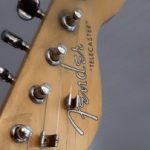MonaLisa Twins Homepage › Forums › MLT Club Forum › General Discussion › Washboard, Teabox and other unusual instruments
-
CreatorDiscussion
-
29/08/2021 at 08:15 #140396

JürgenMemberThe classic rock- or beat band formation usually consists of lead and rhythm guitar, bass and drums. As successfully practiced by the Beatles and reproduced almost even better by Mona and Lisa. But what do you actually do when you don’t have the money for a guitar or drums? The Skiffle Bands have made a virtue out of necessity. John Lennon originally founded the band “The Quarrymen”. The aunt’s washboard or grandma’s washbasin have already been converted into a musical instrument. What crazy or astonishing instruments have you already listened to? Or which musicians have used well-known instruments unconventionally? My very personal favorite is the „Theremin“.
(KATICA ILLÈNYI -Once upon a time in the west- Theremin)
-
CreatorDiscussion
-
AuthorReplies
-
22/03/2023 at 19:28 #199676

Chris WeberMemberSo after watching that woman play the Theremin (and making it look easy, which I don’t really believe is the case), I thought it would be neat to have one, or at least try one.
Didn’t take long to find this — Bob Moog started making them 60 years ago.
https://www.moogmusic.com/products/etherwave-theremin
There’s a good vid on Amazon for a demo too.
-
This reply was modified 1 year, 1 month ago by
 Chris Weber.
Chris Weber.
-
This reply was modified 1 year, 1 month ago by
-
22/03/2023 at 23:53 #199682

Jacki HopperMemberGlenn Gould was a favorite of my late Mom too…she enjoyed many genres of music, big band/jazzy stuff, I think ranked up there with Elvis, others she enjoyed music of ….
-
23/03/2023 at 19:37 #199732

Chris MottramMember-
24/03/2023 at 08:11 #199760

JürgenMemberThanks Chris, Bill Bailey doesn’t ring a bell so I did some googling. He seems to be an entertaining comedian and musician. I think he definitely needs longer arms for his six-neck electric guitar, otherwise he can’t use the full potential of this monster.
-
24/03/2023 at 08:24 #199763

Chris MottramMemberJurgen,
At one point it was on display in the Victoria and Albert Museum in London. I actually have a 4 string Hutchins bass admittedly with only one neck! As they do make normal guitars.
-
-
08/08/2023 at 21:20 #206994

David HerrickMemberApparently this thing has been around since the 60’s, but I had never heard of it before.
-
10/08/2023 at 16:30 #207054

Chris WeberMemberIn the video, you don’t see the power supply it plugs into. If you were thinking about throwing one of these together, here’s a description of how it works under the hood.
Maybe you could get electrocuted by it, it’s grounded. Careful what else you’re holding onto while playing it.
-
29/10/2023 at 18:41 #211281

Tim ArnoldMemberIt seems like every time he plays a note or hits a switch that his house lights flicker. I too would worry about shocks. Some of the tones sound good and it would be fun to play with. It does make a lot of irritating noises too. I’m glad Paul didn’t use it to record Band On The Run. I bet you could use it for a metal detector too.
-
29/10/2023 at 18:49 #211282

Tim ArnoldMemberHere’s a similar guitar that I know nothing about. I just remembered watching this video with Roy Clark and Jim Stafford. This is a very fun rendition of Dueling Banjos by two very talented guitar players.
-
30/10/2023 at 05:58 #211295

JürgenMemberThat’s very entertaining Tim, thanks. The guitar to the right or whatever it’s supposed to be sounds really funny. The instrument could also be used for dubbing cartoons or comic strips.
-
-
10/08/2023 at 07:30 #207033

JürgenMemberHey David,
Vox Guitar Organ? Never heard about that, a very interesting music instrument, thanks. Apparently nobody knew exactly what to do with it or what style of music it could support. Some of the sounds remind me of the old slot machine hits like Donkey Kong & Co.
-
10/08/2023 at 07:43 #207037

Chris WeberMemberYes, slot machine is a good description. It has kind of a mechanical sound to it. Not that much like an organ.
And in the video he said it would cost $600-800.
$600 in 1967 would be $5,413 in current dollars according to this inflation calculator.
https://www.dollartimes.com/inflation/inflation.php?amount=600&year=1967
dollartimes.com
Inflation on $600. How much was $600 worth adjusting for cost of living increases?
Inflation on $600. How much was $600 worth adjusting for cost of living increases?
-
10/08/2023 at 08:01 #207038

JürgenMemberHi Chris,
yes it is a rather mechanical sound, you are right. But I think in the beginning of synthetic music people tried to compare the sounds with something they already knew. When the synthesizers were further developed, a rather pointless undertaking. Thanks for calculating the inflation rate, that’s interesting. Converted $5,413, a proud price! No wonder that this instrument was a slow seller at that time.
-
10/08/2023 at 14:00 #207051

David HerrickMemberI loved watching game shows when I was a kid, but this one is a little before my time. I can tell that the emcee is former Tonight Show host Steve Allen, and one of the panelists is prolific game show host Bill Cullen. Does anyone recognize any of the other panelists?
-
-
10/08/2023 at 07:37 #207035

JürgenMemberIf I understood correctly, inventor of the VOX Guitar Organ Dick Denney, along with his friend Thomas Jennings, created the famous VOX guitar amps that benefited the 1960’s music scene. The Shadows were the first famous band to use VOX amps. Later the Beatles also had VOX equipment. Thomas Jennings dedicated himself to building electronic organs and synthesizers. The Jennings Organo-Univox is one such device. Made by Jennings, it came in a faux snakeskin case that houses the valve amp/speaker and keyboard.
If you are interested in this instrument, you can also buy it restored. Current daily rate: £1,617.38 😀
-
10/08/2023 at 10:43 #207042

Jeffery OhlwineMemberShadows, schmadows! Beatles, Schmeatles! They were ok, I guess, but for the true yardstick of historical significance and importance, just note that MLT likes a good vox amp, too! 😉
-
10/08/2023 at 12:29 #207048

JürgenMember -
10/08/2023 at 12:45 #207050

Jeffery OhlwineMemberI knew you didn’t intentionally leave them out of the Vox club but I had to jump at the chance to give ’em props! 🎸🎶😸
-
-
29/10/2023 at 06:13 #211251

JürgenMemberSpeaking of synthesizers: I can think of another unusual musical instrument. Do you remember the Casio VL1-Tone? The most musical pocket calculator in the world, or at last a musical instrument that can do basic arithmetic (depending on the point of view). An inexpensive synthesizer that everyone could afford, but that not everyone wanted.
youtu.be
Casio VL-TONE VL-1 Full Review
This is the most detailed review of the Casio VL-TONE that you'll find on the internet.Here the full Commando song on the VL-1 here:https://soundcloud.com/8-...
-
29/10/2023 at 12:10 #211263

David HerrickMemberI had a Casio MT-40 back in the day. So much fun!
-
30/10/2023 at 13:25 #211300

JürgenMemberDavid, did you properly play music on your Casio? I have always dreamed of playing the piano or a keyboard. A school friend of mine financed his music studies by performing live as a musician. Back then he had keyboards from Yamaha and Korg. I always enjoyed listening to him, but I found it even more exciting to play around on his keyboards. He didn’t really like that. It’s a pitty, my music teachers at school managed to keep me away from music and unfortunately so did my school friend. Today I use PC software to create simple pieces of music. Just for fun. Certainly a horror for every musician, but for me it is the first time to be creative musically. Just like you may have tried out new sounds and ideas with your Casio.
But back to the topic: In the 80s, electronic organs from the italian company Bontempi were a hit under the Christmas tree. Cheap and small keyboards that had a simple drum machine inside and were intended as an introduction to music. Similar to the keyboards by Casio. More of a child’s toy than a serious instrument. The Bontempi keyboards sometimes somehow also played by themselves and gave the illusion to be a musician. But this illusion of making music without prior knowledge usually ended quickly and often led to disillusionment for many. And so most of these Christmas presents ended up in the junk room. As archaic and simple as the keyboards of that time sounded, they opened a door into a completely new world of sound. For me, a true master and pioneer of electronic music is still Jean Michel Jarre. He was a fantastic sound tinkerer. Although his best-known pieces are almost 50 years old, they still sound like messages from a distant galaxy that inspire our imagination to follow it into hidden dimensions. His music invites us to take a musical walk on the Milky Way, following the tail of glowing comets, passing by radiant supernovas and glittering spiral nebulae. Right into the heart of black holes, straight to the event horizon, where wondrous things await us. A journey through space and time. So in my youthful imagination. Many years later, together with some fellow musicians, Jarre tried to play his most famous album, Oxygen, live. I can’t say how much playback is included here, but it’s all impressive. The collection of his now historic synthesizers alone is worth seeing.
-
30/10/2023 at 14:15 #211301

David HerrickMemberNo, Juergen, I could never play a keyboard “properly”. The best I could do was play four notes at a time, usually one-finger melodies and three-finger chords. All the fancy functions on the Casio were just curiosities for me, and it never even occurred to me to use them simultaneously with the keyboard. I think it was a hand-me-down from a sibling, as I don’t recall actually buying it.
I had a Bontempi electric organ in the late 70’s. There was nothing electronic about it, though. The electricity was just used to blow air through it, so I guess it functioned sort of like an accordion.
The coolest feature I ever had on a keyboard was a condenser microphone that allowed you to input your own short sound, and then the different keys played that sound at different speeds. (I think that was a Casio SK-1, also a hand-me-down.) I could input stupid stuff like belching, or something rapid like snapping my fingers, which turned into a buzz when cycled back on itself.
-
30/10/2023 at 18:15 #211317

Chris WeberMemberDavid,
You wrote: “a condenser microphone that allowed you to input your own short sound, and then the different keys played that sound at different speeds”.
That sounds like a sampler.
-
30/10/2023 at 19:00 #211322

David HerrickMemberI guess it is, Chris. Funny, since I had never heard of a sampler back then, I just described it the way I would have at that time.
-
30/10/2023 at 14:48 #211304

Jung RoeMemberBack in the 90s my first piano was a 72 key Casio keyboard packed with synthesizer, background presets, and it could simulate almost any instrument. I got a stand for it and everything It had MIDI interface that could connect up to my computer and one could theoretically compose music. I never got that elaborate with it. I did my piano lessons on that before I eventually upgraded to a full acoustic upright piano, but hat keyboard was a lot of fun. On occasion because it was portable, I could take it along on a road trip that enabled me to continue my lessons. And now more recently I got a full 88 key Casio Previa digital piano with weighted keys, pedals and everything that simulate my acoustic upright piano.
-
01/11/2023 at 09:25 #211435

JürgenMemberHi Jung,
the electronic gadgets on many keyboards have always fascinated me. Even when all the samples came out and you could suddenly play the violin and guitar on the keyboard, it really blew me away. But as good as the sound of this sampling are, it is very difficult to play a keyboard instrument in a way that makes it sound like a string instrument.
As for your enjoyment of playing the piano, I’m keeping my fingers crossed that you find more time and energy to let this beautiful passion flare up again. I believe that if I had learned an instrument, I would have found much earlier access to areas of music that were closed to me for a long time. One of the first piano pieces that I consciously noticed as a teenager was “Für Elise”. I also really liked some of the music by Smetana, Tchaikovsky, Mussorgsky and Vivaldi. Maybe because it was music that also seemed interesting to young people thanks to its combination of powerful images and beautiful melodies. If someone had taken me by the hand when I was younger and showed me the musical world of Chopin and Liszt, I would definitely have liked it. Here, classical music has become more of a toy for the supposedly educated and intellectual. Surrounded by glamour, stuffiness and money. As a young person and even today, this image alone repelled me. Thereby these composers only wanted one thing: to share their passion for music with other people.
-
01/11/2023 at 15:43 #211456

Jung RoeMemberHi Jurgen
Thanks for the encouragement in regards to my piano. Yes that passion is still there brewing inside of me, with a dream to be a proficient pianist when I retire. For now I am expressing that passion through listening to music and occasional practice. I think I’ve come to realize I shouldn’t seek perfection in technique that seems to be the thing that was drilled down in me from the classical piano lessons I took long time ago, perfecting the scales and technique. Saw some youtube tutorial where they just get you to play a song, even if it is pretty crude. The fun of just being able to play a recognizable tune is a good place to start just to get me playing. I get too much into the perfecting the technique and it’s too easy to lose interest after a while. My dream is to be able to play a full classical piece proficiently, maybe Beethoven’s full Moonlight Sonata, all 3 movements.
I think traditionally in the time of the classical composers like Bach, Mozart and Beethoven, they were employed by wealthy Aristocrats and Kings and Princes, and in absence of media like radio and recordings, the music was only available to the wealthy who could afford a recital or the privileged who might be invited to a performance of a Beethoven Symphony. So I think that stuffy and exclusive image of classical music may have originated from that. Movies like “Amadeus” and “Immortal Beloved” of Mozart and Beethoven portray images of the wealthy and upper class aristocracy in the 18th and 19th Century indulging in classical music. This in my opinion of course is not true today, but that stigma and image that characterize classical music does linger.
I think another aspect is that modern music genres like rock/pop, country, jazz, new age etc…are more approachable and immediately appealing than classical which tends to be more abstract. I think people interested in delving into the classics would find Baroque and music of Mozart more familiar and approachable, followed by Beethoven and Chopin as there is a lot of emotion and passion there. Now Bach is more abstract, but if you can crack into his realm, it is so deep and beautiful, you can’t escape. That is why there are musicians like Glenn Gould and many others who’s work is predominantly dedicated to Bach. Bach is like a strong coffee, bitter and unapproachable on the surface, but when you can crack that shell, like a strong coffee first thing in the morning, your whole being craves it. It took me decades of delving into classical before I was able to crack into the abstract shell of Bach, but wow what an incredible and beautiful world.
-
-
29/10/2023 at 06:23 #211253

JürgenMemberBut can you use the Casio to compose successful music and also become famous? Yes, it works and it goes like this: Take two teachers from Grossenkneten (that’s the name of a place in northern Germany, it is really called that), who are bored by their disinterested students and would rather like to play music. Then, together with a friend, they found a band called „Trio“ and arranged, let’s say, a music-like piece that stayed in the charts for weeks. The trick? Well, it was the 80s, the time of New Wave (we called it the „Neue Deutsche Welle“, NDW for short) and the more crazy the music was, the better. Not everything that ran under the NDW label sounded so weird. There was some really good stuff too. That was also the time when Falco and Nena celebrated their greatest successes
For some the following song is a milestone in minimalist music, for others it’s just the biggest trash they’ve ever heard. The song was released in about 30 countries. About three million singles were sold in Europe, and international sales totaled about 13 million copies. Incidentally, it was produced by Klaus Voorman, who also played the electric bass softly in the background.
“I do not love you, you do not love me”
-
29/10/2023 at 11:50 #211261

David HerrickMemberI remember Da Da Da. It was big here in the U.S. in 1984 while my high school pen pal from France was visiting me. The song had already come and gone in Europe by that point, and he was exasperated at having to endure it again. I never knew the backstory; that’s very interesting!
-
-
29/10/2023 at 06:25 #211254

JürgenMemberNot an unusual musical instrument in the true sense, but a dancing big band is somehow an unusual form of making music:
-
29/10/2023 at 12:10 #211262

Ed WestmorelandMemberIn the survey that we all fill out, I listed JJ Cale as my fav song writer/ composer.
For those that don’t know him, it could be argued that JJ taught Clapton how to play the guitar.
While it is not an unusual instrument, it is generally considered more of a toy than a serious guitar.
Only JJ Cale would have the guts to get on stage with Eric Clapton with a Casio PG 380 guitar in his hands. Enjoy
Edit: notice that @ 0:38 sec. JJ nods to Clapton to take the mic, and Clapton shakes his head no. This is yours JJ.
JJ Cale, Eric Clapton (After Midnight & Call me the Breeze) – YouTube
-
This reply was modified 6 months ago by
 Ed Westmoreland.
Ed Westmoreland.
-
30/10/2023 at 05:41 #211294

JürgenMemberHi Ed,
thanks for sharing that video. I didn’t know JJ Cale by now, but after listening to him playing the guitar, I believe that he has taught Eric Clapton to master this instrument. You’re right, both musicians together sound great. Clapton and Cale have a very similar style.
I didn’t know either that Casio build guitars. When I hear the name Casio, the last thing that comes to mind is an electric guitar. Just like Yamaha. I came across the following instrument by chance. Yamaha certainly produces good grand pianos and keyboards, but the EZ-EG sounds more like a synthesizer or a sampler to me than a guitar.
-
This reply was modified 6 months ago by
-
30/10/2023 at 17:08 #211311

Chris WeberMemberThe first keyboard I ever used was an upright built in 1919. It couldn’t be tuned up to concert pitch, so it was half a step below that. That’s what I practiced on when I was taking lessons. So between lessons and practicing, the fingering was the same, but the pitch was different.
That piano was definitely on theme for this thread as an unusual instrument.
I remember learning Billy Joel’s New York State of Mind by ear on that thing and playing it in C#. Which sounded like the key of C that Billy played it in, more or less.
Never did figure out how to make my guitar capo work on that piano. Lol.
-
30/10/2023 at 20:09 #211326

JürgenMemberHi Chris, 1919? That sounds pretty cool. What brand of piano was it and who was the owner? Do you have a photo of the piano?
-
30/10/2023 at 21:43 #211328

Chris WeberMemberI remember the year it was built because that’s the year my dad was born. Don’t remember who made it, and don’t have a photo of it. It’s gone.
In America, even today, if you want a piano like that, you can probably find someone who’ll give you one, as long as you agree to move it. I found a list of almost 300 “prominent” American piano makers from around that time. I expect there were a lot more less prominent ones.
Next my parents bought a spinet, also not a great piano.
In 1976, I bought a Rhodes, and I still have that. What I use now are synths – the Yamaha has the best action of any keyboard I’ve ever had.
-
30/10/2023 at 22:40 #211330

Chris WeberMemberJürgen,
That piano may not be gone. It sounds like it’s at my brother’s house.
So I might be able to tell you who made it and get a pic. It might take a few days.
As I recall, it’s so old it has real ivory keys. Some of them anyways.
-
01/11/2023 at 09:20 #211434

JürgenMemberThanks Chris. This sounds like an exciting crime story, only this time it’s not the perpetrator that’s being sought, but rather an instrument. I’m waiting with curiosity. Please keep us informed.
-
01/11/2023 at 21:04 #211475

Chris WeberMemberI’m thinking it’s more of an archeological dig than a crime story.
I forgot it had been painted. If it said the maker’s name on the outside, it doesn’t any more. I also forgot that it originally was a player piano. You can see some buttons and levers below the keyboard. But we never had all the pieces for it to work as a player piano.
Some keys are broken. I push the key down, and that’s where it stays. I recall the action had a strip of leather as part of it, so it may have weathered enough to break, Idk. In the pic of the insides, if you zoom in you can see near the middle and down near the bottom, a little reddish tab sticking out towards the camera. I think that’s the leather.
I could reach in with one hand and play chopsticks, so I’m guessing it could still be made about as good as it was when I first used it 60 years ago. Which is not very good.
When was the last time you saw a real ivory keyboard? One of the keys had come off completely, so you can see it up close. If you look near the bottom of it, there’s a horizontal line across it. I’ve read that ivory keys were laminated together from multiple pieces, and that looking at that bottom is one way to validate that it’s ivory.
So what do you think? I know my brother would sell it cheap, like $0, although my sister seems to think it’s a family heirloom. Lol.
-
-
01/11/2023 at 21:05 #211478

Chris WeberMember-
05/11/2023 at 08:47 #211868

JürgenMemberHi Chris,
thank you very much for taking the trouble to look for the old piano. I actually thought more of a detective story than a crime story. I expressed myself incorrectly.
I was expecting an old piano in weathered black paint. I wouldn’t have thought that it was painted white, rather unusual. If you have room for the piano and it’s a nice memory, just keep it. Maybe one day you’ll find a Piano enthusiast who can restore it. It’s actually too bad to just let it rot like that.
-
-
AuthorReplies
Log in to reply.

